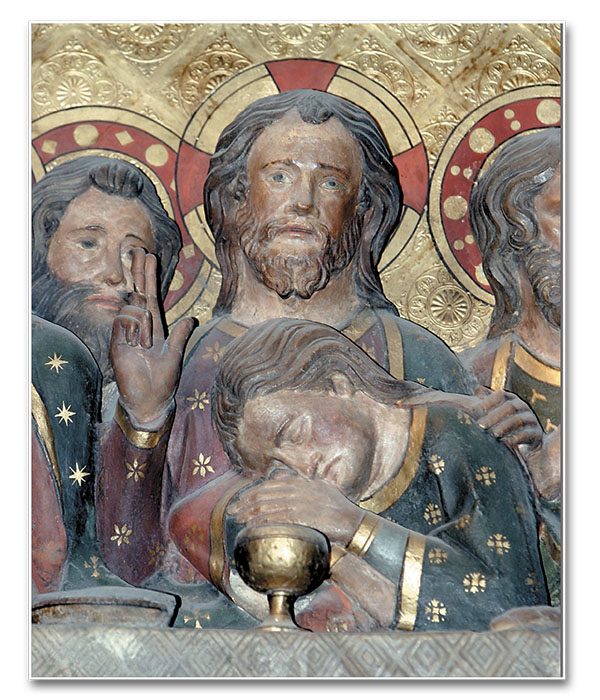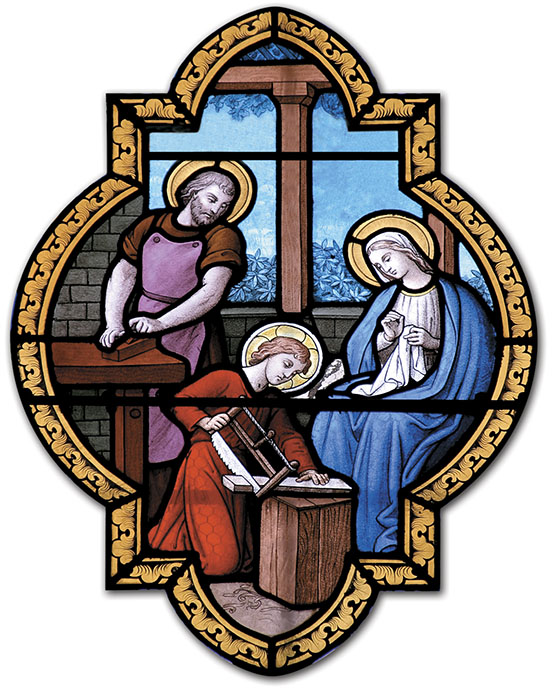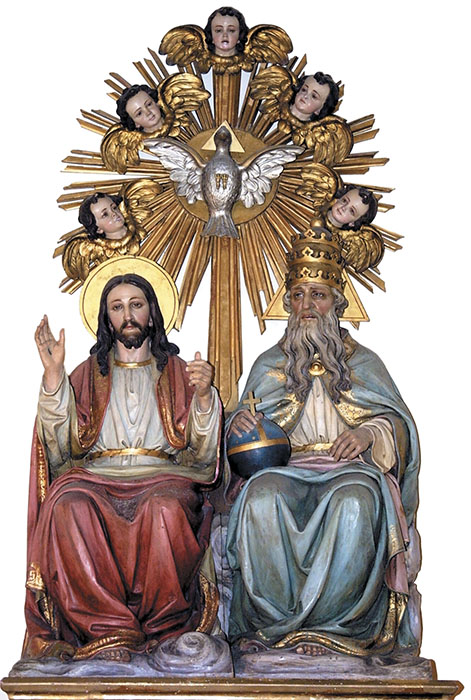Gospel for the 6th Sunday of Easter
Jesus said to his disciples:23 “Whoever loves Me will keep my word, and my Father will love him, and we will come to him and make our dwelling with him. 24 Whoever does not love me does not keep my words; yet the word you hear is not mine but that of the Father who sent Me.
25 I have told you this while I am with you. 26 The Advocate, the Holy Spirit, whom the Father will send in my name, will teach you everything and remind you of all that I told you.
27 Peace I leave with you; my peace I give to you. Not as the world gives do I give it to you. Do not let your hearts be troubled or afraid. 28 You heard me tell you, ‘I am going away and I will come back to you.’ If you loved me, you would rejoice that I am going to the Father; for the Father is greater than I. 29 And now I have told you this before it happens, so that when it happens you may believe”(Jn 14:23-29).
I — Preparing for Departure from this World
Zeal and loving care before departing
“Partir c’est toujours mourir un peu!” To depart is always to die a little, goes the French saying. Although we live in an age of advanced communications, in which distances have virtually disappeared, the departure of a loved one always makes the heart ache. This would have been truer still, in the times of the Roman Empire in which travel was slow and there was no telegraph, telephone, or internet. Add to this the destination to which the Divine Master was heading: not another city or country, but eternity.
With this in view, Jesus endeavours to lovingly prepare His followers for the effects that His definitive withdrawal to the Father will bring. “Let not your hearts be troubled…” He says to His disciples, overflowing with loving and zealous concern.
“Neither let them be afraid.” He wants to console them as much as He can, and have them understand, “before it takes place,” the very great advantages that will come from His departure from this world.
Necessity of Jesus’ departure
The fact is that even after long, intimate and daily contact with Jesus, the disciples still held a very human notion of the Redeemer. On that account, among other reasons, His Ascension into Heaven was necessary in order for the Holy Spirit to imbue them with the true image of the Son of God.
In this respect, St. Augustine tells us: “If He had not withdrawn corporeally, we would always see His body through carnal eyes and would not arrive at spiritual belief; and this faith is necessary so that, justified and beatified by it and having our heart cleansed, we could merit the contemplation of that same Word of God in God.”1
And in another work, the same Bishop of Hippo states: “He well knew what was fitting for them, because the interior vision with which the Holy Spirit would console them was much better, not in a visible body before human eyes, but introducing His own self into the hearts of believers.”2
It is within this perspective of Jesus taking leave of His disciples that today’s Liturgy addresses the most beautiful promises made by Him.

II — Love’s Reward: “And We will Make Our Home with Him”
23 “Whoever loves Me …”
Love occupies a prominent place in our relationship with God. Jesus Himself tells us: “You shall love the Lord your God with all your heart, and with all your soul, and with all your mind. This is the great and first commandment” (Mt 22: 37-38).
In several other passages, Holy Scripture insists on this law of love of God: “With all your might love your Maker” (Sir 7: 30). “Love God all thy life and call upon Him for thy salvation (Sir 13: 18). “Love is the fulfilling of the law” (Rom 13: 10). We may love God imperfectly, seeking to please Him with the aim of receiving the reward of eternal glory. But this love is truncated and is more specifically a fruit of the virtue of hope rather than of charity.
To receive the gifts promised by Jesus in today’s Gospel, we must love God by reason of His being Who He is, and not just to obtain the reward reserved for the good.
“… will keep my word …”
With a divine capacity for synthesis, the Saviour immediately deduces a first consequence of this love: submission to the voice of God.
St. Thérèse affirms: “For love, nothing is impossible.” In effect, the fire of charity tempers us for any and all action, making the virtue of obedience—practiced by Jesus Himself in so exemplary a manner—easy.
He was a model of submission to Mary and Joseph during the first thirty years of His life (cf. Lk 2: 51). It is touching to follow the relationship between Son and Father, throughout the course of Jesus’ public life. The least reference to the Father reveals Jesus’ absolute submission: “My food is to do the will of Him Who sent Me, and to accomplish his work” (Jn 4: 34). “For I have come down from Heaven, not to do My own will, but the will of Him Who sent Me” (Jn 6: 38). The Word became flesh, among other reasons, to teach us the immensurable value of obedience.
From Genesis to the Apocalypse there are shining examples of the practice of this virtue. In one instance it is Samuel admonishing King Saul: “Has the Lord as great delight in burnt offerings and sacrifices, as in obeying the voice of the Lord? Behold, to obey is better than sacrifice, and to hearken than the fat of rams” (1Sm 15: 22). In another, it is St. Paul who admonishes the Hebrews: “Obey your leaders and submit to them” (Heb13: 17). Then, in his Letter to Titus he counsels: “be submissive to rulers and authorities; to be obedient, to be ready for any honest work” (Ti 3: 1). Or it is Abraham who is entirely disposed to sacrifice his only son, Isaac, to fulfil a divine order (cf. Gn 22: 1-12). And what of Job, Tobias, or the mother of the Maccabees? And Mary Most Holy with her fiat?
Obedience is, then, one of the virtues most pleasing to God, and consequently, one of the most necessary. St. Bernard and St. Augustine say that it is indispensable even for the practice of chastity for, whoever does not submit to the orders and desires of a superior, will be unable to repress the concupiscence of the flesh. To be faithful to the Commandments of the Law of God, we need to be pliant of spirit with regard to the will of our superiors.

“… and my Father will love him …”
But this love for Jesus does not confer to the one who possesses it fidelity to divine teachings alone. From it issues an even more precious fruit: “and My Father will love him.”
If love for God brings us such great benefit, what does it signify for someone to be the object of His love?
With masterful lucidity, St. Thomas explains the great capacity of dissemination of good, by reason of its own nature greater the perfection is, the more it tends to fully communicate itself. 3 From the simplest beings, such as minerals, to the supernatural, there is a true symphony of self-giving in the whole order of creation.
Mighty rivers move in search of oceans, fertilizing the land through which they flow. The fresh waters of lakes and rivers, and the salty waters of the sea, furnish mankind with nutriment in profusion. The sun is constantly casting its warm and vital rays over the globe, giving light and life to everything within its reach. The plants with their leaves, flowers and fruits beautify the landscape, perfume the woodlands and gardens, furnish us with oxygen and please us by their tastes. The industrious bee produces her honey for the nourishment and delight of men. Animals multiply and heighten the enjoyment of our repasts and pastimes. The prevailing note in this great symphony is one of rich bounty.
At the human level, the degrees of communication are greater still. Thinkers or artists unfailingly aspire to give ample expression to that which comes to their minds or from their hands. The more a soul ascends along the paths of virtue, the more it longs to do good to others.
Now, God is the Good par excellence. He is substantial Good, and therefore it befits Him to communicate Himself to His creatures to an excellent and full degree.4 This is the highest aspect of the mystery of the Incarnation: in Jesus, His privileged and most holy soul and His sacred body constitute but one and the same Person with the Eternal Word. In Him are all the human properties and the entire divine essence. In Him, the love of the Father reaches an infinite degree. And, through faith, He placed the plenitude of the Good—God Himself—within the reach of all, according to Jesus’ teachings to Nicodemus: “For he whom God has sent utters the words of God, for it is not by measure that He gives the Spirit. The Father loves the Son, and has given all things into His hand. He who believes in the Son has eternal life” (Jn 3: 34-36). Later Jesus adds: “For this is the will of My Father, that everyone who sees the Son and believes in Him should have eternal life; and I will raise him up at the last day” (Jn 6: 40).
Coming directly after Jesus, in the order of beings, and together with Him in the divine and eternal level of creation, is the Virgin Mary at the highest degree of holiness, as the object of this efficacious love of God. She was chosen as the Mother of the Incarnate Word, being penetrated with the most excellent love for God in the order of mere creatures and for being the most loved by the Holy Trinity.

“… and We will come to him and make Our home with him.”
In the Old Testament a clear notion had not yet been reached of the existence and of the operation of the three Divine Persons. With a transparency that leaves no margin for doubt, Our Lord Jesus Christ reveals this mystery, and it is reaffirmed in varied ways by the Apostles.5
In the Gospel of this Sixth Sunday of Easter, the Redeemer again alludes to this admirable mystery, with the word “We.” He also promises to be present in the soul of whoever loves Him and fulfils His precepts. In his first Epistle St. John says: “God is love, and he who abides in love abides in God, and God abides in him” (1Jn4: 16); and St. Paul, to the Corinthians: “For we are the temple of the living God” (2 Cor 6: 16).
How could Jesus promise to come to those who love Him and keep His word, when, in reality God is already present in all creatures?
The Creator, explains St. Thomas, “is in all things, and innermostly (et intime).”6 Or more specifically: “God is in all things by His power, inasmuch as all things are subject to His power; He is by His presence in all things, as all things are bare and open to His eyes; He is in all things by His essence, inasmuch as He is present to all as the cause of their being.”7 In this light, how should we understand this promise of Jesus?
It is not difficult!
Dependence of all created beings on God is absolute, since, besides receiving existence from Him, their nature is continually sustained in this existence. God creates and conserves all that exists, including the devil and even hell itself. Now, a pure spirit is present wherever it acts. Therefore, God is present in all places.
It is not, however, to this presence that Jesus refers in this verse, but rather to another much superior one, exclusive to God’s children, and which always presupposes sanctifying grace (the state of grace).
Note that a permanent presence is referred to here, because Jesus speaks of establishing the home of the Blessed Trinity in the soul of the one who loves Him and keeps His word. It is a spiritual and intimate coming of the Father and of the Son – and since They are inseparable from the Holy Spirit, of Him, as well. St. Augustine teaches: “He comes with His aid, we with obedience; He comes illuminating us, we contemplating Him; He comes filling us with graces, we receiving them, so that His vision may not be something exterior to us, but internal, and the time of His dwelling in us be not transitory, but eternal.”8

Intimate presence of God, as Father and as Friend
With marked clarity and theological precision, eminent theologian, Fr. Antonio Royo Marín, OP, sums up the essence of this inhabitation of the Blessed Trinity in the soul of the just, affirmed by Jesus in this verse: “The intimate presence of the one and triune God, as Father and as Friend. This awesome fact is the essence of the indwelling of the Blessed Trinity in the soul justified by sanctifying grace and supernatural charity.
“In the Christian, indwelling is equivalent to the hypostatic union in the person of Christ, although it is not this, but rather sanctifying grace, which formally constitutes us as adoptive children of God. Sanctifying grace divinizes the soul, by penetrating and formally saturating it. But divine indwelling is like the incarnation of the wholly divine in our souls – of the very being of God just as He is in Himself, one in essence and triune in persons.”9
These are the wonders of the supernatural universe that enable us, through the theological virtues, to fruitfully observe the revelations brought to earth by the Word Incarnate: “That they may all be one; even as thou, Father, art in Me, and I in Thee, that they also may be in Us […] I in them and Thou in Me, that they may become perfectly one” (Jn 17: 21a, 23a).
After having taught the great importance of the love of God, that is, of perfect charity, Jesus, in subsequent verses stimulates the disciples towards the practice of the two other theological virtues: faith and hope.
III — Conclusion
Today’s Gospel invites us to assume a corresponding inter ior attitude. Jesus is no longer visibly among us, having risen to Heaven two millennia ago. But through the Sacrament of Baptism and the operation of the Holy Spirit, we have His figure traced in our souls, inviting us to love Him exclusively. Grace aids us along this path. Our whole existence revolves around only two loves, for there is not a third: love of God taken to the point of self-forgetfulness, or love of self, taken to the point of forgetting God.
Which of these loves is practiced by our historic era, and what are the corresponding consequences? This question merits serious consideration on the occasion of the Ascension of Our Lord into Heaven, whence He will judge the living and the dead – that is, those who loved and those who refused to love. ◊
Notes
1 ST. AUGUSTINE. Sermo CXLIII, n.4. In: Obras, vol. VII. Madrid: BAC, 1958,p.368.
2 ST. AUGUSTINE. In Ioannis Evangelium, tractatus XCIV, n.5. In: Obras, vol. XIV. Madrid: BAC, 1957, p.509.
3 Summa Theologiae, III, q.1, a.1; Summa Contra Gentiles, L.III, c.3, n.1.
4 St. Thomas teaches that the love of God is so efficacious that it reaches the point of infusing good into the creature loved by Him: “The love of God infuses and creates goodness” (Summa Theologiae, I, q.20, a.2).
5 See, for example, Mt 28: 19; 2 Cor 13:13; or 1 Pt 1:2.
6 Summa Theologiae I, q 8, a 1
7 Idem, a 3
8 ST. AUGUSTINE, apud ST. THOMAS AQUINAS. Catena Aurea. In Ioannem, c.XIV, v.22-27.
9 ROYO MARÍN, OP, Antonio. Somos Hijos de Dios. Madrid: BAC, 1977, p.47-48.


